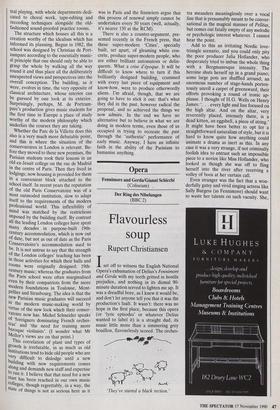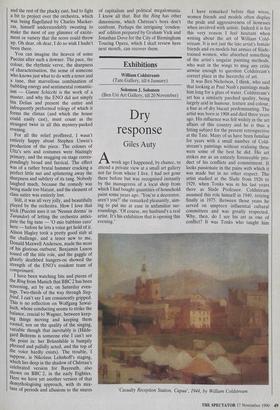Opera
Der Ring des Nibelungen (BBC 2)
Flavourless soup
Rupert Christiansen
Iset off to witness the English National Opera's exhumation of Delius's Fennimore and Gerda with my teeth gritted in hostile prejudice, and nothing in its dismal 90- minute duration served to lighten me up. It was a dreadful bore, as I knew it would be, and don't let anyone tell you that it was the production's fault. It wasn't: there was no hope in the first place, because this opera (or 'lyric episodes' or whatever Delius wanted to label it) is a straight dud, its music little more than a simmering grey bouillon, flavourlessly scored. The orches- `They've started a black section.' tra meanders meaninglessly over a vocal line that is presumably meant to be conver- sational in the magical manner of Pelleas, but comes out fatally empty of any melodic or psychologic interest whatever. I cannot hear the point.
Add to this an irritating Nordic love- triangle scenario, and you could only pity the poor producer Julia Hollander, who desperately tried to imbue the whole thing with a Bergmanesque intensity. The heroine shuts herself up in a grand piano; some large pots are shuffled around; an enormous number of stage-hands porten- tously unroll a carpet of greensward, their efforts provoking a round of ironic ap- plause. I thought of H.G. Wells on Henry James: `. . . every light and line focused on the high altar. And on the altar, very reverently placed, intensely there, is a dead kitten, an eggshell, a piece of string.' It might have been better to opt for a straightforward naturalism of style, but it is hard to know quite how anything could animate a drama as inert as this. In any case it was a very strange, if not criminally foolish idea to entrust such an impossible piece to a novice like Miss Hollander, who looked as though she was off to fling herself into the river after receiving a volley of boos at her curtain call.
Even stranger was the fact that a won- ' derfully gutsy and vivid singing actress like Sally Burgess (as Fennimore) should want to waste her talents on such vacuity. She, and the rest of the plucky cast, had to fight a bit to project over the orchestra, which was being flagellated by Charles Macker- ras, himself understandably sweating to make the most of any glimmer of excite- ment or variety that the score could throw up. Oh dear, oh dear, I do so wish I hadn't been there.
You can imagine the heaven of some Puccini after such a downer. The pace, the colour, the rhythmic verve, the sharpness of characterisation, the sense of someone who knows just what to do with a tenor and a tune, that marvellous combination of bubbling energy and sentimental romantic- ism — Gianni Schicchi is the work of a master, and why the ENO did not simply bin Delius and present the entire and infrequently performed trilogy of which it forms the climax (and which the house could easily cast), must count as the strangest twist in all this mystery-packed evening.
For all the relief proffered, I wasn't entirely happy about Stephen Unwin's production of the piece. The colours of Ultz's sets and costumes were blazingly Primary, and the mugging on stage corres- pondingly broad and farcical. The effect was of a rather brutal hammer cracking a perfect little nut and splintering away the sharpness and subtlety of its tang. Nobody laughed much, because the comedy was being made too blatant, and the element of class satire was entirely lost.
Still, it was all very jolly, and beautifully played by the orchestra. How I love that trick (Puccini uses it on 'Nessun dorma' in Turandot) of letting the orchestra antici- pate the big tune — '0 mio babbino caro' here — before he lets a voice get hold of it. Alison Hagley took a pretty good stab at the challenge, and a tenor new to me, Donald Maxwell Anderson, made the most of his glorious outburst. Benjamin Luxon tossed off the title role, and the gaggle of ghastly deathbed hangers-on showed the strength of the ENO's resident team of comprimarii.
I have been watching bits and pieces of the Ring from Munich that BBC 2 has been screening, act by act, on Saturday even- ings. Two-thirds of the way through Sieg- fried, I can't say I am consistently gripped. This is no reflection on Wolfgang Sawal- lisch, whose conducting seems to strike the balance, crucial to Wagner, between keep- ing things moving and keeping them rooted; nor on the quality of the singing, variable though that inevitably is (Hilde- gard Behrens is someone else I can't see the point in: her Brunnhilde is bumpily phrased and pallidly acted, and the top of the voice hardly exists). The trouble, I suppose, is Nikolaus Lehnhoff's staging, which lies deep in the shadow of Chereau's celebrated version for Bayreuth, also shown on BBC 2, in the early Eighties. Here we have yet another version of that demythologising approach, with its mix- ture of periods and allusions to the snares of capitalism and political megalomania. I know all that. But the Ring has other dimensions, which Chereau's boys don't confront. Perhaps the intriguing 'conden- sed' edition prepared by Graham Vick and Jonathan Dove for the City of Birmingham Touring Opera, which I shall review here next month, can recover them.
























































 Previous page
Previous page